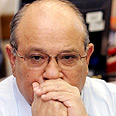
Report: Israel targeted N. Korean nuclear equipment
Sunday Times quotes Israeli officials as saying airstrike in Syria 10 days ago was planned in late spring after Mossad obtained evidence that Syria was seeking nuclear equipment. Meanwhile, North Korean official describes as 'groundless' reports that his country was giving nuclear expertise to Damascus
Israel had been mulling an airstrike against Syrian targets since late spring, after Mossad chief Meir Dagan presented Prime Minister Ehud Olmert with evidence that Damascus was seeking to buy a nuclear device from North Korea, the London Sunday Times reported.
An Israeli official told the newspaper that the spy chief feared the device could be fitted on Scud-C missiles and used in future military conflicts with Israel.
"This was supposed to be a devastating Syrian surprise for Israel,” said the Israeli official. “We’ve known for a long time that Syria has deadly chemical warheads on its Scuds, but Israel can’t live with a nuclear warhead.”
On September 7, Syria said Israeli aircraft entered its airspace a day earlier and dropped munitions near the border with Turkey.
The Washington Post quoted Saturday a US official as saying that Israel had targeted suspicious material labeled as cement that arrived from North Korea three days before the airstrike.
The Washington Post identified the target as an agricultural research centre on the Euphrates river that Israel had been monitoring for some time, fearing that it was being used to extract uranium from phosphates.
The Sunday Times said Israel Air Force commandos positioned themselves near the facility a day before the raid, ready to direct laser beams at the target for the approaching jets.
The newspaper said eight F15I jets and a UAV carried out the airstrike 50 miles from the Iraqi border.
An Israeli air force official told the Times that the Israeli satellite Ofek 7, launched in June, was diverted from Iran to Syria. It sent out high-quality images of a northeastern area every 90 minutes, making it easy for air force specialists to spot the facility, the Times wrote.
The newspaper said that Sergei Kirpichenko, Russia's ambassador to Syria, warned President Bashar Assad last month that Israel was planning an attack against Syria, but hinted that the target was the Golan Heights.
N. Korea denies nuclear ties with Syria
Meanwhile, A senior North Korean official denied a report that Pyongyang was giving nuclear expertise to Syria, South Korea's Yonhap news agency reported on Sunday.
"They often say things that are groundless," Yonhap quoted Kim Myong-gil, deputy chief of the North Korean mission to the United Nations, as saying.
Kim said he had nothing more to say and hung up the phone when asked to elaborate, Yonhap said.
North Korea is widely thought to sell conventional weapons to Syria though analysts say its armaments trade in general has been hit hard by tough sanctions since the reclusive state nearly a year ago tested its first nuclear device.
Pyongyang agreed earlier this year to start dismantling its nuclear facilities, and source of weapons-grade plutonium, in return for massive aid. More recently, the United States has held out the possibility of normalising ties if the ostracised North completely scraps its nuclear weapons programme.
The Syria reports have angered US conservatives who believe North Korea cannot be trusted to keep its word and that talks on nuclear disarmament with regional powers, expected to resume next week, the six-party talks, are bound to fail.
On Friday, the lead US negotiator with North Korea declined to confirm the Syria reports but said they underscored the need for Pyongyang to give up its nuclear programs.










